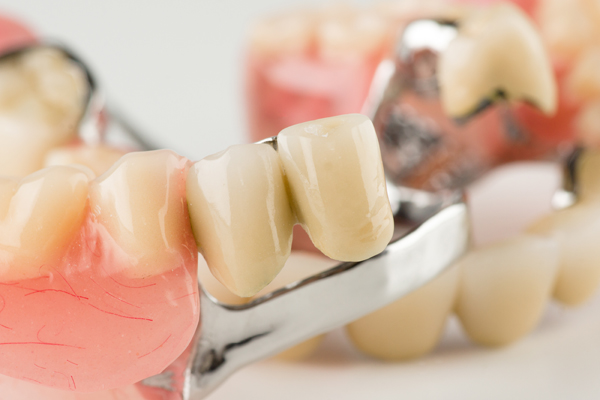Are Dental Crowns a Permanent Solution?

A dental crown is basically a cap or cover that a dentist puts on the patient’s tooth. Your dentist may recommend that you get a dental crown for one of several reasons. You may need a crown if your tooth is cracked, weakened or severely worn down. In other cases, you can opt to have a crown placed for cosmetic reasons. Many people choose dental crowns because they can help correct a wide range of problems and can last for many years.
The life span of a dental crown
The dental crown procedure often requires two separate dental visits. At the first appointment, the dentist will examine the patient’s tooth. This will help the dental provider to ensure that it can support a dental crown. It will then be filed down to prepare for the crown. If the tooth is either severely damaged or broken, the dentist will have to fill it in to make it big enough to properly receive the dental crown.
After the tooth is filled or filed to the ideal shape, the practitioner will take an impression of the tooth and those around it. The impression will then be sent to a dental lab so that the permanent crown can be made. During this first visit, the practitioner will make a new temporary crown to help protect the prepared tooth. This is just a temporary fix until the permanent crown is ready. The final crown will eventually be cemented in place at the second visit after the removal of the temporary crown. After the procedure is complete, it may take a while for a person to get used to it.
How long crowns last
Crowns, on average, often last between five and 15 years. The life span usually depends on a number of factors. These include the amount of wear and tear the dental crown is exposed to and how well a person follows good oral hygiene practices. Other factors that can affect how long crowns last are a person’s personal mouth-related habits.
Caring for the crown
To prevent damage to crowns, patients are usually advised to do several things. It is vital for a patient to brush twice a day and to floss daily to remove plaque. Using the recommended oral care products is always a positive thing. It is necessary for patients to avoid some harmful habits like chewing ice and clenching or grinding their teeth. Using the teeth to open packaging and biting fingernails are also discouraged. Moreover, patients should see their dentists for periodic exams and teeth cleanings.
Takeaway
Many patients prefer dental crowns because they can last for several years. But it is crucial for people to take proper care of them. Individuals can ensure the longevity of crowns by taking particular steps like practicing good oral hygiene and avoiding harmful habits. You should also spare the time to see your dentist on a regular basis for checkups and cleanings. If you have any questions about how to take care of your dental crown after the procedure, talk to your dentist.
Are you considering getting a dental crown in the Delaware area? Get more information at https://sexton-dental.com.
Check out what others are saying about our services on Yelp: Read our Yelp reviews.
Recent Posts
For tooth loss, partial dentures are a good treatment option. This appliance not only revives your smile and appearance, but it can have health benefits as well. Your dentures allow you to chew effectively again and eat healthy foods. Replacing missing teeth will also help to prevent additional tooth loss and bone loss. A partial…
Understanding the key differences between a dentist and an orthodontist can help patients determine which specialist they need for their oral health care. While both professionals focus on maintaining and improving oral health, their roles, training, and areas of expertise differ significantly. A dentist typically handles general dental care, while an orthodontist specializes in diagnosing…
The purpose of dental onlay is to restore the appearance and function of the tooth following severe tooth decay or damage. The patient will be able to use their teeth like before. Unfortunately, dental restorations do not last forever and may fail eventually, either due to aging, injuries or accidents. Knowing what causes the dental…
If you experience soreness or pain in the jaw, you may want to talk with your dentist about TMJ treatment and whether the condition is causing your pain or other issues. Temporomandibular joint dysfunction (TMJ) is a serious condition that causes stiffness in the joints of the jaw, pain, soreness, swelling, and loss of movement.…


